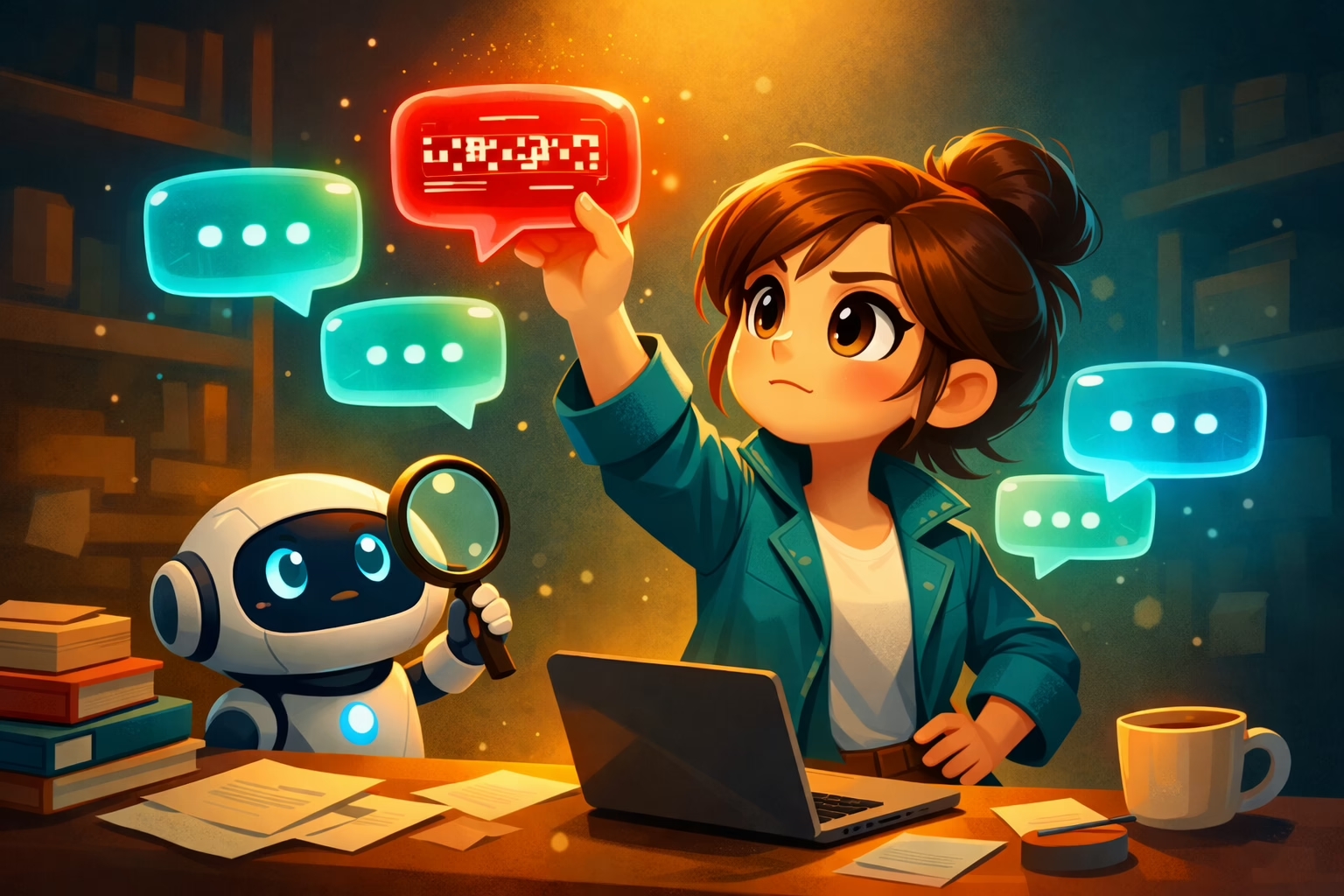Artificial intelligence sales and AI coaching have become game-changers in personal and professional development. Research shows that AI coaches match traditional human coaching in effectiveness when pursuing clear goals. A significant 37% of executives already see the value of combining human expertise with AI in coaching, including sales coaching platforms.
AI-powered coaching platforms have eliminated the traditional roadblocks to personal growth. Users can access guidance any time of day or night, and these platforms can coach multiple people at once. The systems track individual performance and adapt to each person’s learning style to provide immediate feedback and guidance. The International Coaching Federation’s AI Coaching Standards now ensure these platforms maintain ethical practices and deliver results, especially in the realm of sales coaching.
The next few years will showcase AI coaching’s revolutionary impact on how people grow and develop professionally. This piece walks you through everything from advanced coaching agents to real-life applications of sales AI software. You’ll discover what AI coaching can do today and what possibilities lie ahead through 2025, including the potential of virtual sales assistant AI.
The Evolution of AI Coaching Through 2025
The digital world of AI coaching has changed remarkably over the last several years. What started as simple rule-based chatbots in the early 2000s has now become sophisticated coaching agents that provide customized guidance and support, particularly in the field of sales coaching.
From basic chatbots to sophisticated coaching agents
The experience started with simple rule-based systems that used predefined keyword responses but couldn’t handle complex questions. Smart virtual assistants emerged in the 2010s and brought AI into our daily lives through smart home integrations. The coaching industry saw a big change by 2024, when 72% of coaches started offering virtual options, compared to just 40% in 2020. This shift paved the way for more advanced AI sales coaching solutions and automated coaching systems.
Today’s AI coaching platforms show unique capabilities to analyze client behavior and provide evidence-based insights. Modern systems can assess emotional tone, measure communication effectiveness, and give customized feedback based on individual progress. The global coaching industry reached USD 4.56 billion in 2022 and grew an impressive 60% since 2019, with sales coaching contributing significantly to this growth.
Key technological breakthroughs
Large Language Models (LLMs) represent one of the most important advances that revolutionized how AI coaches interact with users. These models train on massive amounts of data and understand context, grammar, and semantics with high accuracy. Natural language processing helps AI coaches interpret and respond to emotions, offering empathetic support like human coaches. This technology has been particularly beneficial in developing conversational AI for sales and enhancing speech recognition capabilities.
Generative AI marks another breakthrough, enabling coaching systems to:
- Analyze user performance and adjust their approach automatically
- Give feedback during practice sessions in real-time
- Create customized development paths based on individual goals and progress
Video-based evaluation models have transformed coaching feedback. These systems analyze engagement levels, persuasive arguments, and non-verbal communication cues. This technology helps AI coaches deliver more complete and nuanced feedback, which is crucial for effective sales call coaching and sentiment analysis.
How user expectations have shaped development
User needs drive AI coaching’s rise. Millennials and Gen Z show growing interest in wellness and personal development, which pushes the creation of better coaching solutions, including online sales coaches. McKinsey reports that 82% of US consumers now think about wellness as a priority in their daily lives.
Users want customized experiences, which led to AI coaches that can:
- Monitor individual progress and update recommendations in real-time
- Give feedback that matches personal learning styles
- Help users when they need it, meeting the need for flexibility
The industry addresses data privacy and ethical concerns seriously. The International Coaching Federation created complete AI Coaching Standards to ensure responsible development of AI coaching solutions. These standards cover transparency in AI coaching decisions, bias reduction, and user autonomy, which are crucial for agent coaching software and CRM integration.
The future looks promising. The online coaching market should reach USD 11.70 billion by 2032, while AI investments in research and development might hit USD 200.00 billion by 2025. These numbers show growing confidence in AI coaching, with 66% of coaches feeling optimistic about the industry’s growth potential, especially in the realm of sales performance coaching.
How AI Coaching Apps Are Reshaping Personal Growth
AI coaching applications, including sales coach platforms, have transformed personal growth by offering exceptional support and guidance. These smart platforms are changing how people work toward their development goals through analytical insights and active participation.
24/7 accountability and motivation
AI coaching platforms have transformed how we think about accountability by offering support and motivation around the clock. Traditional coaching has time and availability limits, but AI coaches give immediate feedback when users need guidance. This constant availability helps people keep moving forward on their development trip, which is particularly valuable for sales professionals seeking continuous improvement.
Users who participated more often with AI coaching platforms achieved their goals by a lot. A newer study showed that people with more than six AI sales coaching sessions increased their goal achievement by 37.62% compared to 17.62% for groups who used it less.
AI coaches shine at keeping consistent check-ins and tracking progress through:
- Regular follow-up messages to monitor goal progress
- Continuous analysis of user behavior patterns
- Automated reminders for scheduled activities
- Real-time feedback on performance metrics
Personalized development pathways
Smart algorithms help AI coaching platforms create individual growth experiences. These systems analyze how users interact and break down performance into specific parts:
They start by assessing visual aspects like body language, eye contact, and facial expressions. Next comes the audio components including tone of voice and delivery. The final step looks at content effectiveness by tracking elements like persuasion, empathy, and logical structure. This comprehensive analysis is particularly beneficial for sales training and improving sales skills.
Personalization goes beyond simple feedback. AI coaches can:
- Create progressive sequences based on individual progress
- Change difficulty levels automatically
- Give custom recommendations that line up with personal goals
- Build tailored action plans for skill development
Research confirms that AI coaching works as well as human coaches when goals are clear and measurable. A comparison study showed both AI and human coaching groups had similar positive outcomes in goal attainment, with effect sizes of ηρ2 = 0.269 and ηρ2 = 0.265 respectively. This effectiveness extends to AI sales training, where clear metrics can be easily tracked and improved.
The psychology behind effective AI coaching interactions
AI coaching succeeds because it uses carefully designed psychological principles. These platforms use positive psychology and solution-focused coaching to create engaging and effective learning experiences, which is crucial for personal sales coaches.
Trust builds through transparent communication. AI coaches tell users their limitations and purpose right away, which helps people understand what they can expect. This honest approach builds credibility and encourages users to interact more openly with the platform.
The psychological framework of AI coaching includes several important elements:
- Proactive assistance that anticipates user needs
- Context-aware responses that show understanding
- Consistent personality traits that promote familiarity
- Regular positive reinforcement to keep motivation high
AI coaches have proven particularly effective in specific areas. To cite an instance, investment banking teams using AI-driven coaching tools cut their decision-making cycles by 45% and increased deal closures by 30%. This success demonstrates the potential of AI in enhancing sales performance and productivity.
Behavioral science principles make AI coaching platforms do more than share information – they make real behavior change easier. These systems use techniques like micro-learning and spaced repetition to help users build new habits and skills, which is particularly valuable in sales coaching and objection handling.
All the same, AI coaching currently works best in structured, goal-oriented scenarios. Human coaches still have the upper hand with complex emotional issues or deep-seated behavioral changes because of their better empathy and emotional intelligence. This suggests that a combination of AI and human coaching might be the most effective approach for comprehensive sales training and development.
AI-Based Coaching in Professional Skills Development
AI-based coaching systems are taking professional development to new levels by helping employees build targeted skills across many areas. These breakthroughs are changing the way organizations train and develop their staff, particularly in sales and customer-facing roles.
Communication and leadership improvement
AI coaching platforms have showed remarkable results in building better communication and leadership skills. Teams with supervisors who use AI coaching tools saw their employees complete 32% more skill development programs. These systems look at how people communicate – from the way they speak to their body language – and give complete feedback to help them improve. This comprehensive analysis is particularly valuable for sales call coaching and improving overall sales strategy.
The numbers show how well AI coaching works for developing leaders:
- 70% of people who received coaching reported better work performance and job satisfaction
- Teams with emotionally smart supervisors came up with more creative ideas
- Organizations that use AI coaching platforms saw participant confidence grow by 92%
Technical skills building and support
AI coaching platforms excel at helping people learn technical skills through customized learning paths. These systems make use of machine learning to track individual progress and adjust training suggestions. Studies show that AI-powered learning platforms make people 40% more likely to participate and remember 25% more of what they learn. This effectiveness extends to sales AI software, which can help sales teams master complex product knowledge and sales techniques.
Modern AI coaching tools now include up-to-the-minute feedback. They can:
- Look at performance data to find skill gaps
- Suggest specific learning paths
- Give instant guidance during practice
- Measure progress with clear metrics
Soft skills growth through AI simulation
AI coaching’s most innovative use might be in developing soft skills. AI platforms create realistic scenarios where people can practice interpersonal skills. Harvard University research shows that 85% of job success comes from good soft skills. This is particularly relevant for sales professionals who rely heavily on interpersonal skills to succeed.
AI simulations help build soft skills in several ways:
- Safe places to practice tough conversations
- Quick feedback on emotional intelligence and empathy
- Standard ways to assess communication
- Fair evaluation across multiple practice sessions
AI coaching makes a big difference in soft skills as job requirements grow 10% each year. Companies using AI coaching see better results in key areas:
- Better team collaboration and communication
- Stronger conflict resolution skills
- More effective leadership
- Higher emotional intelligence and empathy
People stay more engaged with AI coaches. Even those who usually don’t like training find AI coaches helpful and easy to work with. This works well because AI gives feedback without judgment and lets people practice as much as they want. This aspect of AI coaching is particularly beneficial for sales teams who need continuous practice and feedback to improve their skills and refine their sales playbook.
Note that the best results come from mixing AI and human coaching. Industry experts say AI should increase what human coaches can do, not replace them. This lets coaches focus on complex interactions and personal guidance. This combined approach gives a complete learning experience while keeping the human touch needed for complex personal growth, especially in sales performance coaching.
AI Agent Coaching: The New Frontier
AI agents have created a breakthrough change in the coaching scene. These autonomous systems now deliver individual-specific guidance at an unprecedented scale. The next development in AI-based coaching shows these sophisticated agents moving beyond traditional rule-based systems to offer dynamic, context-aware support, particularly in the realm of sales coaching.
What makes AI agents different from standard coaching tools
AI agents stand out because they know how to operate autonomously and make independent decisions. Research shows that AI agents can process and analyze huge amounts of data live. This helps them handle complex tasks across multiple processes. These agents show remarkable capabilities in:
- Contextual awareness and decision-making in complex systems
- Goal-driven autonomy with minimal human intervention
- Deep functionality beyond simple response generation
Their biggest strength lies in maintaining internal models of the world. This allows them to handle partially observable environments well. Unlike simple coaching tools, AI agents can update their knowledge continuously based on new percepts. This makes them much more adaptable to changing situations, which is particularly valuable in the dynamic field of sales.
Autonomous learning and adaptation capabilities
AI agents reshape coaching through their sophisticated learning mechanisms. These systems use advanced techniques like reinforcement learning and multi-agent systems to improve over time. Their learning capabilities include:
They use both short-term memory for in-context learning and long-term memory to retain and recall infinite information. This dual-memory system helps them provide more complete responses with each interaction, making them effective virtual sales coaches.
These agents also show remarkable adaptation by:
- Creating workflows on their own
- Making good use of available tools
- Completing complex tasks with minimal supervision
Research reveals a 45% accuracy improvement through continuous learning and feedback mechanisms. This remarkable progress comes from storing data about solutions to previous obstacles in their knowledge base, which is particularly useful for sales AI software and improving sales efficiency.
Real-life applications across industries
AI agents work in many sectors and reshape how organizations approach coaching and development. Financial services now see underwriting time reduced from two weeks to just three hours. Manufacturing companies use AI agent-powered predictive maintenance tools that have cut machine downtime by 50%. This has boosted maintenance staff productivity by 55%.
Customer service has changed too. AI agents now handle complex queries with growing sophistication. HubSpot’s Breeze AI shows how agents can involve customers proactively with individual-specific recommendations while automating administrative tasks. This technology is particularly relevant for conversational AI for sales, enhancing customer interactions and sales processes.
Healthcare has seen AI agents improve patient care through:
- Individual-specific treatment planning
- Live health monitoring
- Predictive diagnostics for early intervention
Numbers prove these applications work: organizations using AI agents spend 40% less on maintenance. Teams that use AI agents make decisions 32% more efficiently. In the sales context, this efficiency can translate to faster deal closures and improved sales productivity.
Currently, 99% of developers building AI applications for enterprise are learning about or developing AI agents. This widespread adoption shows how agentic AI can stimulate professional development and organizational growth. These systems will keep getting better at providing nuanced, context-aware coaching. This makes them increasingly valuable for personal and professional growth, especially in sales coaching and training.
Measuring the Impact of AI Coaching
AI coaching needs both numbers and feedback to check how well it works. Recent research shows some eye-opening facts about how these digital coaching solutions affect people and companies of all sizes, particularly in the realm of sales coaching and training.
Quantitative metrics for success
Success measurement in AI coaching depends on analytical insights. Research shows AI coaching platforms got results similar to human coaches in reaching goals. AI coaches scored ηρ2 = 0.269 while human coaches reached ηρ2 = 0.265. Companies that use AI coaching should keep track of:
- Goal achievement rates and completion timelines
- Performance improvements in specific skill areas
- User participation metrics and session frequency
- Return on investment through cost-benefit analysis
People who used AI coaching more often saw their goal achievement jump by 37.62%. Those who used it less only improved by 17.62%. This proves that regular use of AI coaching platforms makes a big difference, especially in sales training and performance improvement.
Qualitative assessment methods
Numbers tell only part of the story. Quality-based evaluation gives us a better picture of how well AI coaching works. Key assessment methods include:
- Deep user feedback through surveys and interviews
- Changes in behavior after coaching
- Better communication results
- Growth in leadership skills
Research tells us AI coaching platforms work best with clear, goal-focused scenarios. They might struggle with complex emotional situations. So organizations need evaluation systems that look at both hard numbers and personal experiences, particularly when assessing the impact of sales coaching platforms and overall sales team performance.
Comparing outcomes with traditional coaching approaches
The sort of thing I love about recent studies is how they compare AI and human coaching side by side. AI coaches work quickly in structured settings. They can process and analyze coaching sessions in 3-15 seconds. AI coaching platforms also shine in other ways:
They’re available 24/7, unlike traditional coaching’s limited hours. They also give quick feedback and track progress, which helps make immediate improvements. This constant availability is particularly valuable for sales teams who often work irregular hours and need support at various times.
AI coaching’s economical solutions stand out. Traditional coaching in Africa costs about 100 USD per session. AI offers a more available option. This makes coaching available to more people worldwide, including access to online sales coaches.
In spite of that, each type of coaching has its strengths:
- AI coaches work best with clear, measurable outcomes
- Human coaches do better with personal development
- AI stays more consistent with goal theory principles
AI coaching platforms work even better with human oversight. Companies report 25% better knowledge retention and 40% more participation when they use AI-powered learning platforms. This hybrid approach can be particularly effective in sales enablement, combining the consistency of AI with the nuanced understanding of human coaches.
Organizations should use solid data practices and be open about how they measure results. This helps everyone understand coaching’s effectiveness while protecting private information and staying ethical. This transparency is crucial in building trust in AI sales coaching systems and generating valuable coaching insights.
Ethical Frameworks for Responsible AI Coaching
Building resilient ethical frameworks is the life-blood of responsible AI coaching development. AI systems grow more sophisticated each day. Organizations must prioritize transparency, fairness, and user privacy to build trust and ensure long-term adoption, especially in sensitive areas like sales coaching and performance analytics.
Transparency in AI coaching decisions
Trust in AI coaching systems depends on explainability. Recent studies show that only 2% of firms are ready for AI in any discipline including transparency and governance. Organizations must put in place:
- Clear documentation of AI algorithm logic and reasoning
- Detailed model evaluation and proving methods
- Full disclosure of training data inputs
Organizations rated as “mature” in AI governance show 45% higher user trust levels. This proves why AI coaching decisions need to be understandable through detailed documentation and clear communication channels. This transparency is particularly important in sales AI software, where decisions can directly impact revenue and customer relationships.
Addressing bias and fairness
Bias mitigation is critical to ethical AI coaching. AI systems can make existing biases worse and create unfair outcomes for different demographic groups. Government-backed hiring systems have filtered out 27 million workers in the US due to automated and AI-based biases.
Organizations must put strict testing protocols in place to curb these challenges. To name just one example, facial recognition technologies show major accuracy gaps between demographic groups. This highlights the need for detailed fairness evaluations. Essential steps include:
- Regular algorithmic audits to detect discrimination
- Fairness constraints in model design
- Output disparity monitoring across user groups
These considerations are particularly important in sales coaching, where biases could lead to unfair treatment of certain customer segments or sales team members.
Data privacy and user autonomy
Data privacy has become paramount in AI coaching implementations. Organizations need resilient data governance frameworks that protect personal information while keeping coaching effective. Studies reveal 75% of consumers in most countries rank privacy of personal information as their top priority.
Effective privacy protection needs several key elements:
- Secure data storage and encryption protocols
- Clear consent mechanisms for data collection
- User’s control over personal information sharing
- Regular privacy impact assessments
These privacy measures are crucial in call coaching software and agent coaching software, where sensitive customer information may be processed.
Industry standards and best practices
The International Coaching Federation has created detailed AI Coaching Standards to ensure ethical implementation. These standards provide a framework to:
- Evaluate AI coaching tools against best practices
- Line up with coaching competencies
- Keep professional standards in AI applications
About 19,000 security professionals have completed the SAIF Risk Self Assessment for tailored reports of AI risks in their organizations. This shows the growing focus on standardizing ethical practices in AI coaching deployment, including in sales performance coaching.
Organizations using these frameworks see major improvements in user trust and participation. Companies can earn ISO/IEC 42001 certification through proper governance, proving their commitment to responsible AI development. This certification ensures they follow ethical guidelines while improving AI coaching practices continuously, which is particularly important for maintaining trust in AI-driven sales coaching and training systems.
Conclusion
AI coaching, particularly AI sales coaching, is leading a revolutionary change in personal and professional development. Simple chatbots have evolved into sophisticated coaching agents, including virtual sales assistants AI. This evolution shows how the technology has matured and proven its worth. Studies show AI coaches can match their human counterparts when it comes to achieving measurable goals. They also provide round-the-clock availability and steady feedback, which is particularly valuable in sales coaching.
AI shines in structured, goal-oriented scenarios, making it ideal for sales training and performance coaching. Human coaches remain crucial for handling complex emotional situations. The future points to AI and human coaching working side by side, each playing to their strengths. Market confidence in this balanced approach remains strong, with projections reaching USD 11.70 billion by 2032.
Success stories from companies of all sizes prove AI coaching’s real impact, especially in sales. Teams have improved their communication skills and leadership abilities through AI-driven sales coaching platforms. Strong ethical frameworks and industry standards are the foundations of lasting growth. AI coaching, including sales AI software and virtual sales coaches, will become a powerful tool for personal and professional growth as more organizations embrace these solutions.
FAQs
Q1. What are the main benefits of AI coaching? AI coaching offers 24/7 availability, personalized guidance, and real-time feedback. It can analyze individual performance, adapt to learning styles, and provide consistent support for achieving clearly defined goals. This is particularly beneficial in sales coaching, where continuous improvement and immediate feedback are crucial.
Q2. How does AI coaching compare to traditional human coaching? AI coaching has shown comparable effectiveness to human coaching for structured, goal-oriented scenarios, such as sales training. It excels in providing immediate feedback and tracking progress, but human coaches still have an advantage in handling complex emotional situations and developmental coaching.
Q3. What ethical considerations are important in AI coaching? Key ethical considerations include transparency in AI decision-making, addressing bias and fairness, ensuring data privacy, and maintaining user autonomy. Industry standards and best practices, such as those developed by the International Coaching Federation, help guide responsible AI coaching implementation, particularly in sensitive areas like sales performance coaching.
Q4. How is AI coaching impacting professional skills development? AI coaching is transforming professional development by enhancing communication and leadership skills, facilitating technical skills acquisition, and providing realistic simulations for soft skills practice. It has shown particular effectiveness in improving team collaboration and decision-making efficiency, especially in sales coaching and training.
Q5. What does the future hold for AI coaching? The future of AI coaching likely involves a hybrid approach, combining AI and human coaching strengths. AI is expected to handle more transactional aspects of coaching, such as initial assessments and progress tracking, while human coaches focus on complex emotional and developmental areas. The industry is projected to grow significantly, reaching $11.70 billion by 2032, with sales AI software and AI sales coaching playing a significant role in this growth.

Kateryna Quinn is an award-winning entrepreneur and founder of Uplify, an AI-powered platform helping small business owners scale profitably without burnout. Featured in Forbes (NEXT 1000) and NOCO Style Magazine (30 Under 30), she has transformed hundreds of service-based businesses through her data-driven approach combining business systems with behavior change science. Her immigrant background fuels her mission to democratize business success.



